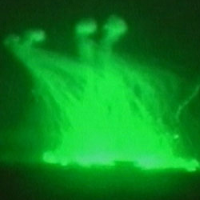U.S. Bombing of Fallujah Led to Enormous Rise in Birth Defects
 Night attack on Fallujah November 9, 2004 (AP Photo)
Night attack on Fallujah November 9, 2004 (AP Photo)
The U.S. war in Iraq has had long-lasting health implications for the children of Fallujah and other cities due to heavy metals used in American weaponry.
Birth defects have shot up in recent years, increasing 17-fold at one Iraqi hospital, according to a study published in the Environmental Contamination and Toxicology Bulletin. Recorded birth defects included congenital heart defects, brain dysfunctions and abnormal limbs.
The U.S. Army first occupied Fallujah, a city of more than 300,000 people about 45 miles west of Baghdad, in April 2003. But it was the following year, following the dismembering of four U.S. mercenaries, that the Americans launched their deadliest attacks, which included the use of white phosphorus.
The authors of the study found children with birth defects had five times the level of lead in their hair than healthy children. Also, mercury levels were six times above normal.
The findings are expected to be supported by a World Health Organization report due to be released next month.
-Noel Brinkerhoff
To Learn More:
Metal Contamination and the Epidemic of Congenital Birth Defects in Iraqi Cities (by M. Al-Sabbak, S. Sadik Ali, O. Savabi, G. Savabi, S. Dastgiri and M. Savabieasfahani, Environmental Contamination and Toxicology Bulletin) (pdf)
Study Shows High Number of Birth Defects in Bombarded Iraqi Cities (Al Arabiya)
Army Captain Returns to Combat after 60 Surgeries (by Noel Brinkerhoff, AllGov)
TF 2-2 in FSE AAR: Indirect Fires in the Battle of Fallujah (by James T. Cobb, Christopher A. LaCour and William H. Hight, Field Artillery)
- Top Stories
- Unusual News
- Where is the Money Going?
- Controversies
- U.S. and the World
- Appointments and Resignations
- Latest News
- Trump to Stop Deportations If…
- Trump Denounces World Series
- What If China Invaded the United States?
- Donald Trump Has a Mental Health Problem and It Has a Name
- Trump Goes on Renaming Frenzy






Comments